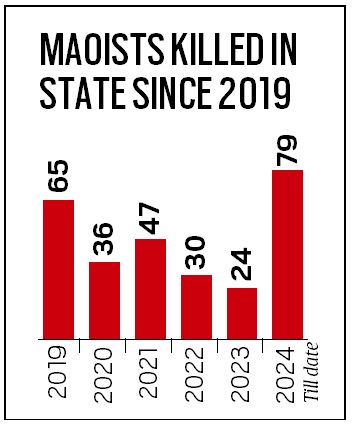
Quite disappointing
Days before 29 Maoists were killed in encounter, Bastar Inspector General said in interview: ‘Will leave no safe pockets for Naxals’
Bastar’s Kanker district saw yet another encounter on Tuesday, with 18 Naxals killed by security personnel. Before this, the first four months of 2024 have seen 74 people lose their lives in Maoist violence in Chhattisgarh’s Bastar, which goes to polls on April 19. Security forces have killed 50 Naxals in the corresponding period.
Bastar’s Inspector General (IG), Sundarraj P, has spent 11 years in the Maoist-affected region, making him the longest-serving IPS officer there. He spoke to The Indian Express last week about the government’s push to end Left Wing Extremism and the security arrangements for the elections.
A. More 60,000 security personnel, including our special forces and additional forces deployed by the Election Commission of India (ECI), have been deployed in Bastar.
A. IEDs are a big threat and challenge for us. So, for the general elections, we have already conducted multiple demining operations in the area and are continuing to do so. Such operations are going on at inter-state and inter-district borders also. So far, 55 IEDs have been found.
Unfortunately, during the Assembly polls in 2023, we lost two of our men, but from a casualty point of view, we had minimal casualties when compared to previous elections over the last three-four decades.
A. The polling booths have been moved taking force availability and other factors into consideration. However, compared to the 2019 Lok Sabha elections, 106 more polling booths are functioning now, and despite the (Maoists’) boycott call, we are hopeful that the local population will come out to vote in high numbers.
A. We have an integrated, multi-pronged approach. The main focus area is effective operations, and better inter-state operations against the banned CPI (Maoist). Second is development – we want to connect internal areas at block and district level by road, bridges, and mobile networks so that people in the interiors are connected to the outside world and basic services can be provided to people in remote areas. Third is community outreach, to clear the wrong perception created by the Naxals who project us as being here to exploit the jal, jungle, and zamin (water, forest, and land). Over the years, we have succeeded in winning the trust of villagers.
A. We are not underestimating the strength and capability of the CPI (Maoist) to inflict damage on us, even though their cadre base is dying down and their area of influence is shrinking. IEDs are the big challenge, and security forces have been adequately briefed.
A. This is a typical modus operandi of the CPI (Maoist) to misguide the local population and try to create the perception that security forces have done something wrong… But in the majority of exchanges of fire, most of the bodies found are of local (Maoist) cadres living in and around the area… They use the local cadre as human shields while the senior cadres manage to escape.
A. There are some pockets in Bijapur, Sukma and Kanker, where we are steadily moving in. But there is a security vacuum in some areas like Abujhmad (an are larger than Goa, but sparsely populated), which provides a safe haven to senior cadres. (There is also) the National Park in Bijapur, which is a safe transit route, but sparsely populated, and a pocket on the state borders at Bijapur and Sukma. Our operations are ongoing and we are not going to leave any safe pockets for the Naxals.
A. My career has grown alongside development in Bastar. I was first posted as ASP in 2005-2006 in undivided Bastar. LWE activities, whether it was death of security personnel or civilians, had peaked from 2004 to 2014 in Bastar. This coincided with (the formation of) our new state, which was trying to adapt to this challenge with limited resources. Our local police was 25,000 strong, and now we are 1 lakh. We trained our jawans in jungle warfare and made technological interventions.
Initially, Naxals started with some ideological background, but over time, they became a group of extortionists without any ideology. We are seeing a declining trend (in Naxalism), and we are hopeful of seeing a positive outcome very soon.
A. In a majority of cases, the accused have been arrested. If not the main culprit, at least those associated with the conspiracy, or been part of their network, have been arrested. The NIA is also looking into a few cases.
Jayprakash S Naidu – 2024-04-16 18:35